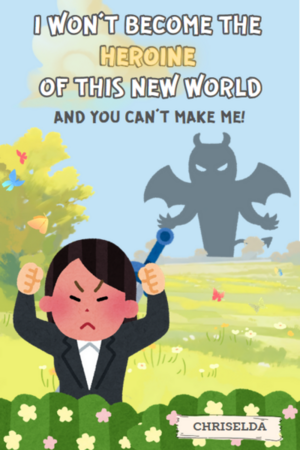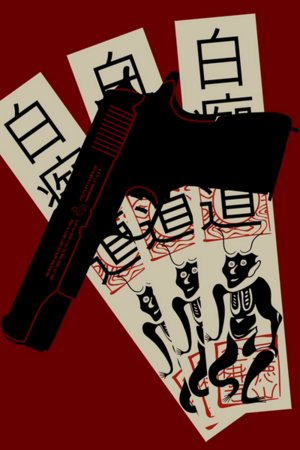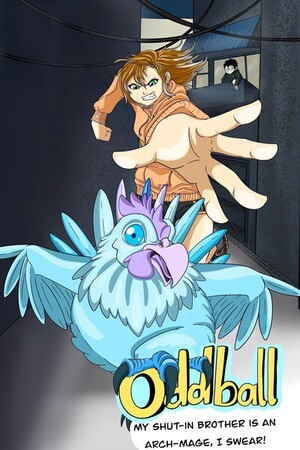Chapter 1:
Everything Will Be Fine
I Won't Become the Heroine of This New World, and You Can't Make Me!
My work desk mirrors the whole of my life: perfectly clean, organized, and boring beyond all reason.
I never understood why people kept little trinkets and baubles at theirs. Some had potted plants, others pictures of their families. The occasional fidget toy, decorative figurine, or colorful mouse pad made a splash as well. All I have are documents (annotated), binders (stacked and tabbed), and a white, stain-free mug half-filled with black coffee on a bamboo coaster.
“Akagi,” a co-worker says into the phone receptor, “as for the schedule for Tsumori’s release next week I sent you…”
“That’s completed,” I say. “I’ve made a few changes, and the proof is finalized. You should see it in your inbox soon; be sure to distribute it according to the list I’ve attached.”
“Thank you!”
“What do you think?” another one of my subordinates asks later as I review the speech she’s prepped for the same event. “Is it too informal?”
“We can make a few alterations to the wording while keeping the spirit the same,” I say, tucking the phone against my ear and marking a couple of places with red on the e-document. “Try and incorporate these changes and email me the second copy.”
I’ve barely received her polite appreciations before I’m accosted with more emails, more requests, more things requiring my approval.
I didn’t set out in life to become a middle-manager, especially not one for a marketing division of a literary company. But it enabled me to put my skills of overly-clinical analysis, keen observation, and straightforward communication to good use.
An unexpected benefit is that nobody expects to be especially friendly with a manager. And no has even attempted to do as much with me.
It all works out perfectly.
Well, most of the time.
As I’m pouring myself a second cup of coffee in the break room, someone clears their throat.
“Oh, Higuchi,” I say, turning to her. “Can I help you with something?”
Higuchi Yuki brushes her caramel bangs back and forth across her forehead. We’re on a similar level, in terms of our standings within the company, though she isn’t involved directly in marketing or promotion, as she’s a content manager for the nonfiction titles we represent. Which is why I’m a little confused as to why she’s approaching me; in the few instances we do work together, it’s always in a meeting, conference call, or an email chain. She seems friendly enough, but then again, I don’t know anything about her aside from her name, her job title, and the fact that we share a boss in our senior managing director of nonfiction titles.
What my co-workers do, think, or how they feel outside of work is of no concern to me.
I don’t need friends. Certainly not ones at my job.
For a second, some dread overcomes me. Is she trying to have some kind of personal conversation with me? It is technically lunch time, and I am in a communal room… but I internalize a sigh of relief when she says, “Miyamoto wants to speak with you, if you have a moment.”
I nod and thank her without further ceremony, returning my cup to my desk and fetching a folder of printed material. I can guess that Miyamoto wants an update on Tsumori’s campaign – the current author whose most recent book we are promoting – so I make sure I have all of the necessary items in place to present to him. I’m sure he’s just looking for confirmation that everything is on the right track.
Which it is, of course. I’m always on track.
I knock on his office door, and bow politely when admitted. “Good afternoon,” I start. “Higuchi mentioned that you’d like to speak with me.”
Miyamoto never looks especially pleased at anything – I’d describe his general expression as the picture of neutrality – but he also rarely displays any measure of annoyance. I’m surprised, therefore, to note the inexplicable resentment etched onto his face. “Sit, Akagi.”
I do as he says folding my hands across the documents on my lap. “How can I help, sir?”
“I’ve never had cause to complain about your performance since you joined our team, Akagi. But lately, it seems like you’ve had your mind elsewhere.”
“I… apologize, but I’m not sure what you mean, sir.”
He gestures to some documents on his desk – his own copies of Tsumori’s materials, I realize. “This whole campaign has been under your direct purview for months, and it’s not performing to standard. Are you aware that the magazine article we are supposed to submit today is late? Not even just late, but riddled with errors.”
My brow furrows. I flip through my own stack and find what he’s referring to. “I did review this yesterday and completed a final pass. Could you point out what errors you’re seeing, sir?”
“The whole thing is just wrong,” he says with a derisive sigh. “The tone, the content… you should have caught these, and had them do an entire rewrite.”
“Perhaps we should have come to you with an earlier draft—”
“That’s my point, Akagi. You can’t come running to me with every little issue. It’s your job to know these things, and be on point.”
My back straightens. I can’t afford to get angry. This isn’t the first time we’ve… disagreed on something, though he’s never been this blatantly rude with his words before. But when I look at the document, everything seems up to standard. It went through three rounds of editing on my side alone. There’s nothing wrong with it.
I can’t say any of that, obviously. But I can’t help myself when I ask, “Is anything the matter, sir?”
It’s plain by the look on his face that my tact was wrong. “There is, in fact. I’m just wondering whether or not you’re really cut out for this role, after all. You’ve been on the management team a whole year, and yet, you continue to make such flippant mistakes. We don’t want to continue to have to bear the burden of them.”
This turn is so drastic that it makes me flinch. He’s never spoken to me this way before. Something bubbles in my chest – not even anger, but shame – and I have to resist the automatic urge to defend myself, to counter him. But, even if he’s is just in a bad mood, arguing with him is a pointless endeavor. I want to keep my job, after all.
So, I bow my head, and bite back my words. “I’m sorry for the inconvenience, sir. I’ll do my best to consider these things with a better point of view in the future.”
He seems placated enough by my bootlicking, and waves me out of the room. “See that you do. Fix the article by the end of the day.”
I slink back to my desk, pulling up the document for review, and prepare to call the author into my office for a grueling editing session. The article isn’t the issue, I know that much. The truth is that it doesn’t even really matter what the issue is, only that there is one, and it’s my fault.
Familiar brown hair appears in my periphery, and I jolt. “Higuchi,” I breathe, hand to my chest. “You startled me.”
She hovers at my door. “Sorry, Akagi! I just, er—”
“What can I do for you?”
“Nothing! I just… overheard what Miyamoto was saying to you. I wanted to see if everything… if you were all right.”
“I’m fine,” I say automatically. Never mind the truth. She didn’t need to know that.
“If you’re sure…” Yuki tilts her head, eyes wide. She doesn’t immediately leave, though.
So I give the best, friendliest smile I can manage. “Really, no big deal. I appreciate it.”
She smiles back – genuinely – and finally excuses herself. I let the fake expression slip away as fast as I donned it.
I don’t know why anyone bothers. It’s all fake niceties, anyway.
I’m beyond thankful that the rest of the work day passes without incident. When we resubmit the article to Miyamoto, he approves without any flourish. And by the time evening rolls around and I finally step out of the office into the warm summer air, I’m almost recovered from that whole incident. Surely, I can iron out these random issues with him another day, when he’s less crabby. For now, the weekend is here, the weather is nice, the sunset is pretty…
Then, my phone rings. And when I see the caller ID, my stomach clenches.
“Hi, mom,” I say as I pick up. The forced neutrality of my voice doesn’t go unnoticed.
“You sound like you aren’t looking forward to speaking with me,” she says. Her tone is it’s usual – clipped, cold, and haughty, made all the more distant by the tinniness of the call.
“Sorry. Did you need something?”
“Can’t a mother call her daughter without some kind of agenda?”
“Of course.” Of course not.
She doesn’t miss a beat: “Your father and I would like to know in advance if you are bringing anyone to dinner next weekend.”
Dinner, right. Since moving from my family home in Yamaguchi to the splendor of Tokyo for work almost four years ago, I’ve only managed to commit one trip a month to visit them. Usually, that would be the our only interaction, save for a few welfare check-ins via phone call from my rather emotionally distant father, or belittling questions from my mother. Sometimes, I’m so fortunate as to have both in one sitting. Nothing sits quite as miserably as inquiries about your nonexistent love life from a type-A parent, who expects you to follow in her footsteps to every degree.
“No, I don’t have anyone like that. I’ll be sure to let you know as soon as I do.”
“Your sarcasm is not appreciated,” she says. “Nine million people in that city and you can’t find a single person to spend your time with?”
“I’ve been busy with work.” It’s not even a lie, but I doubt she really cares for any reason, rational or otherwise.
“Sounds like an excuse to me. You can at least pretend not to have such a bad personality to get a date. You’re already twenty-seven; you should try a little harder.”
I clench my phone harder, and suppress a scathing How would you know anything about me? “I don’t have a bad personality, mom.”
“Of course you do. You were born with one. You never had any friends growing up, much less a boyfriend. You’re pretty enough, if a little plain. It must be something with your personality, how you act, that deters people.”
My mother’s criticisms of me haven’t been this direct since I left home. I thought the distance had improved our relationship, even if only slightly, given that she hasn’t taken either extreme of outright ignoring or harassing me over these years. But it seems I was wrong.
If I hadn’t already been berated by one person today, maybe I could smooth this one over. But the sickly shame comes back full force, and manifests into hot anger pressing in my chest.
My response is automatic and too quick to bite down. “Glad to see you haven’t actually changed at all.”
“What was that?” her tone is sharp. It takes an all too familiar edge – the calm before the storm.
Luckily, at this point, I’m practically a bomb shelter. “I’m not really interested in discussing any of this with you right now. Feel free to call me back if you have anything genuinely productive to say.”
Then I do the unthinkable, and hang up without waiting for a reply.
I don’t know exactly when my heart hardened. My mom’s disappointed voice echoes in my head, going back years, all the way to my early elementary days, where a small and shy seven-year-old Haruka was told for the very first time how much of a burden she was.
The change came steady after that moment. Because if my mom couldn't handle me, how could anyone else? I couldn’t get close to anyone. What if I burdened them? How could I have friends if all I am is a useless embarrassment? They would leave me, too.
I couldn’t rely on anyone. I didn’t need to. I didn’t want to.
I shove my phone in my purse, wavering like a leaf in the wind as I stare at the entrance to the train station. I could go home, curl up with my cat Beckett and forget all about today.
Or…
Turning, I pace off in another direction, and head straight for the izakaya nearest my workplace. Sometimes, you just need to let off a little steam. I don’t go out to get drunk that often – okay, maybe a couple times a month, sue me – but if there was ever a day that needed a drink or three after work, it’s today.
Before I know it I’m seated comfortably, holding a cold beer and surrounded by a mouthwatering spread of food. In between bites I sip hot sake, its warmth quickly spreading through me.
But even that doesn’t stop tears from welling in my eyes. I wipe at my face with my clammy palm, already wet from the condensation of a frosty can. Much as I like to believe I’m immune to it all, as ardently as I believe myself the cool, calm, collected woman I so desperately want to be… the truth is that it still hurts.
I’ll never know what my mother saw in her child’s face to treat her with such contempt. All I do know is that sometimes, sorrows need to be drowned.
Today wouldn’t end off on a bad note.
Everything would be totally and completely fine.




Please sign in to leave a comment.